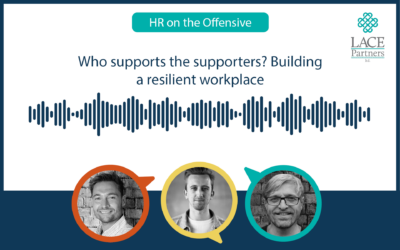This week’s blog sees our co-founder and MD Cathy Acratopulo and Director Chris Horton de-mystify the difference between a People Strategy and an HR Strategy, as well as discussing how HR Directors can articulate and operationalise their strategies over time.
HR strategy and People strategy: what are the key differences?
People strategy is the business articulation of how the business strategy will be achieved from a people perspective. As the HR Director, you are a member of the executive team and actively contributing to the development of the business goals. You then interpret what the business needs to do differently with its people to achieve the target outcomes. The people strategy then sets this out in short and simple business language for the business stakeholder audience. In comparison, the HR strategy sets out how the HR function will achieve the target people outcomes. In comparison, the audience is the HR community so can be written in ‘HR language’ whilst being anchored in business outcomes. What is it that HR will create, change and deliver regarding how employees are managed within the organisation? How will the HR function set itself up to achieve this in terms of capabilities, policies, processes, systems and structure? The People Strategy defines the what and the HR Strategy sets out the how.
So what content can you expect to find in a People strategy rather than an HR strategy?
Imagine your primary business goal is to grow significantly. The People Strategy will set out at a high level the intent to change the workforce in terms of numbers, capabilities and locations. In comparison, the HR Strategy might focus on more practical aspects such as how you will improve talent sourcing channels and recruitment practices to attract greater numbers or how you may address training services to ‘grow your own’ capabilities.
Have people strategies needed to change over the last year?
The last year has meant that the way we manage our people has never been higher on the business agenda. There is an increased focus on wellbeing and flexible working for example in response to the pandemic. And HR has a renewed role to play in shaping workplace strategy. Organisations are also prioritising a focus on diversity and inclusion more than ever before. The digitisation agenda is also a top discussion topic as many organisations are moving to more hybrid ways of working. Even in manufacturing or customer facing industries, there will still be aspects of the workforce that may be looking for more flexibility in the way they work e.g. support functions or head office employees. As a result, the way you manage a workforce is more complex and digital tools are needed to ensure you are able to continue to offer a positive employee experience whilst not alienating people who aren’t physically in the workplace.
How often should businesses review their people and HR strategies?
This entirely depends on how often the business strategy is updated as the two are inextricably linked. We work with some organisations that review every year, some might do it over a longer period, some might do it more often – but ultimately it makes sense to review your strategic people and HR goals when there is change happening in the business. As well as tying into the business planning cycle, there may be a need to react to changes externally such as new competitors entering the market or a shift in legislation. Or the business may be acquiring or divesting. Either way, People and HR strategies need to be living documents that underpin the business and HR narrative when discussing people change and updating on progress, rather than documents that are written once and left on a shelf. If you would like support determining your People or HR strategies or have any questions on what you’ve read we would be happy to discuss them with you – contact us here.






